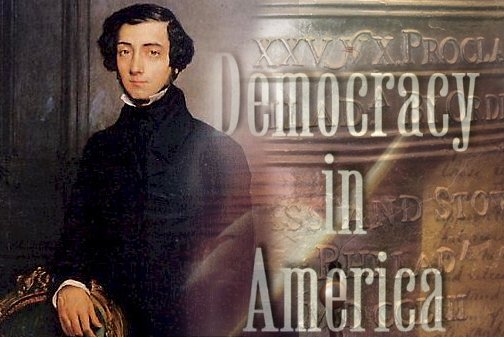
Alexis de Tocqueville, writing and observing the young American republic in the early 19th Century, had a lot of interesting things to say.
For example:
“Democracy and socialism have nothing in common but one word, equality. But notice the difference: while democracy seeks equality in liberty, socialism seeks equality in restraint and servitude.”
Better phrasing would have substituted “limited government” for “democracy,” but you get the idea. There’s a distinction between a society which upholds equality under the law and a society which upholds equality of results. Today’s entitlement state is designed to make sure everyone lives under equal conditions. Notice that as the economy fails to grow, or even declines, how proponents of the entitlement state pay that no mind. So long as we have continued growth in government retirement, social security, medical care and other benefits, it’s considered a great society. If everyone gets poorer, so be it. So long as everyone is equal in condition.
And de Tocqueville is right that socialism means servitude. There’s no way to make everyone equal in condition without forcing some to provide for others. The moment this starts, people are not equal under the law. Some have more rights under the law than others. In other words, some are forced to provide wealth and/or products/services to be redistributed to others. Others, in turn, are entitled to receive the products of others’ labor. You cannot have equality under the law and democratic socialism at the same time.
De Tocqueville also writes: “The American Republic will endure until the day Congress discovers that it can bribe the public with the public’s money.”
Prophetic words indeed. Congress’ bribery of the public is not new. It began after de Tocqueville’s time, but long before our own time. We have arguably reached the tipping point, however, where the electoral majority now endorses it above everything, including even economic growth itself. Government-financed “security” comes first; private property and economic growth (at best) come second.
“I cannot help fearing that men may reach a point where they look on every new theory as a danger, every innovation as a toilsome trouble, every social advance as a first step toward revolution, and that they may absolutely refuse to move at all.”
Interesting. That sounds a lot like the Untied States today. Any argument from principle is regarded as “extreme” and therefore wrong. Yet people who argue for higher taxes on the rich, socialized medicine, nationalizing the production and use of energy, are all relying on economic, moral and political principles. They are not required to state their principles, it seems. Yet anyone who challenges them on principle is regarded as not deserving of time.
“In no other country in the world is the love of property keener or more alert than in the United States, and nowhere else does the majority display less inclination toward doctrines which in any way threaten the way property is owned.”
Oh my, how times have changed. Private property is no longer a valid argument in favor of anything. And yet the vast majority of Americans — billionaire socialists included — still love their property. Missing is any concept of what property rights really are. Property rights are the implementation of individual rights. It’s impossible to say you have a right to your own body, to choose your own sexual partners, to read the books you want to read and then turn around and say the government owns private property and is free to spread it as it sees fit. You can’t have rights without having property rights. Yet the prevailing policies of our day maintain that rights to certain things involving personal matters do still exist, while private property is by definition the property of government — maybe not in name, but surely in the practice of seizing income and redistributing it.
“The health of a democratic society may be measured by the quality of functions performed by private citizens.”
In other words: It’s the private sector, stupid. Like your smart phones? Like your computer technology? These all happened for a profit, in the private sector. You like life-saving medical drugs and procedures? Again, these grew out of the hated for-profit economy. Anything valuable that is created, innovated or produced happens because of the thinking mind in the private economy, and in spite of the government. Government is absolutely necessary to protect private property. But government creates or advances nothing, otherwise. And yet, to look at our experts today, who insist on the need to borrow trillions more in order to spend on government “technology and business,” you would think that all innovation takes place in the public sector.
Alexis de Tocqueville primarily wrote to describe a young American republic, as he saw it in the early 19th century. He ended up largely predicting the state of America in the 21st century.
Be sure to “friend” Dr. Hurd on Facebook. Search under “Michael Hurd” (Rehoboth Beach DE). Get up-to-the-minute postings, recommended articles and links, and engage in back-and-forth discussion with Dr. Hurd on topics of interest.
